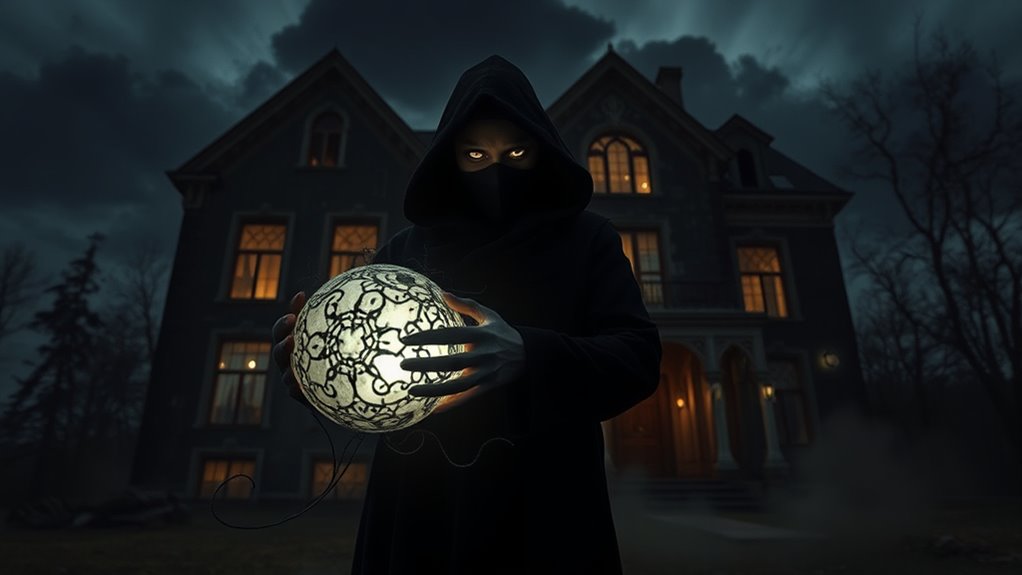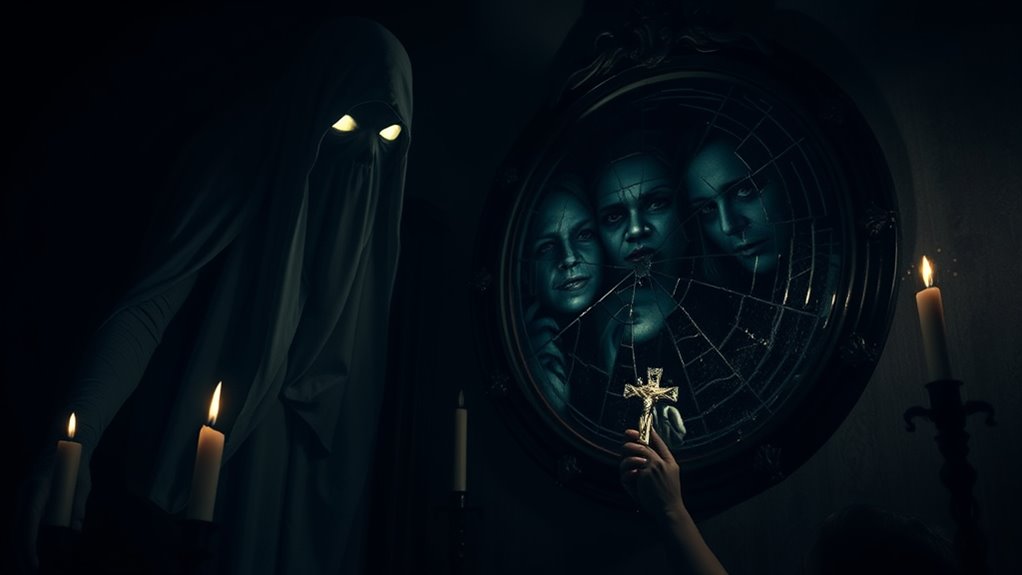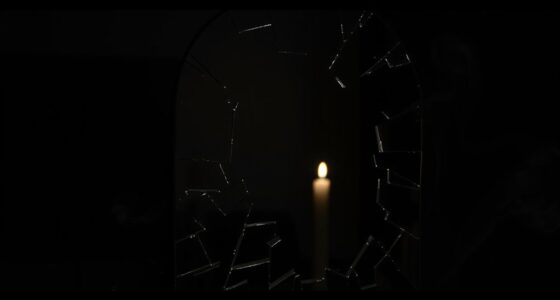Many believe possession happens frequently, but in reality, it’s extremely rare. Most so-called cases are actually mental health issues like schizophrenia or depression, which get mistaken for supernatural phenomena. Cultural myths and sensational stories in the media often reinforce the idea that possession is common. Understanding the difference between myth and fact helps you see that true possession cases are very few. Keep exploring to uncover more truths behind this fascinating topic.
Key Takeaways
- Actual possession cases are extremely rare; most reports are misinterpretations of mental health symptoms.
- Myths about widespread possession persist due to cultural narratives and sensationalized media stories.
- Many behaviors attributed to possession are caused by treatable mental health conditions like schizophrenia or bipolar disorder.
- Believing possession is common can hinder proper medical treatment and reinforce stigma around mental health.
- Recognizing the difference between myth and reality promotes understanding and ensures individuals receive appropriate care.

Many myths persist because they seem believable or are passed down through generations, but understanding the difference between myth and reality can help you see the truth clearly. One common misconception is that possession by spirits or demons is widespread, but the reality is quite different. People often interpret unusual behaviors or mental health symptoms as signs of demonic influence, but many of these cases are better explained by psychological disorders. Conditions such as schizophrenia, bipolar disorder, or severe depression can produce behaviors that might seem abnormal or frightening but are rooted in medical issues rather than supernatural forces.
The idea that possession is common feeds on fears and cultural narratives, yet actual cases are rare. Mental health professionals see thousands of patients each year, and only a tiny fraction display symptoms that could be mistaken for possession. Most of these individuals are experiencing mental health crises that require psychological treatment, not exorcism. When someone displays strange behaviors—such as speaking in unfamiliar languages, showing sudden violent tendencies, or having a distorted perception of reality—it’s vital to consider psychological disorders first. These conditions can cause symptoms that, without proper understanding, might be misinterpreted as demonic influence.
Understanding this distinction is essential because it prevents unnecessary fear and harmful treatments. Believing that possession is common can lead you to dismiss real mental health needs or stigmatize those suffering from psychological disorders. It’s important to recognize that mental health issues are medical conditions, often influenced by genetics, brain chemistry, and life experiences. They can be managed or treated with therapy, medication, and support. Jumping to supernatural explanations can delay proper care and exacerbate suffering, especially when individuals are misunderstood or ostracized based on myths.
Furthermore, the portrayal of possession in popular media and folklore often exaggerates its frequency, reinforcing the myth that it’s a common phenomenon. These stories tend to sensationalize rare cases, making them seem more typical than they are. In reality, most reports of possession are misinterpretations of mental health symptoms, cultural expressions, or extreme stress responses. Recognizing that psychological disorders are a much more likely explanation helps you approach these situations with compassion and rationality, rather than fear rooted in myth. Additionally, understanding symptoms of mental health issues can help differentiate between medical conditions and supernatural explanations, leading to better support and treatment for those affected.
Frequently Asked Questions
How Do Experts Differentiate Between Possession and Mental Health Issues?
Experts differentiate possession from mental health issues by examining cultural influences and understanding diagnostic challenges. You should consider whether behaviors align with cultural beliefs or show signs of psychological conditions. They look for consistent symptoms, medical history, and psychological assessments, rather than just cultural explanations. This helps avoid misdiagnosis, ensuring that genuine mental health issues are treated appropriately while respecting cultural contexts, making distinctions clearer and more accurate.
Are There Specific Cultures With Higher Reported Cases of Possession?
You’ll find that certain cultures report higher cases of possession, with some regions like West Africa and Haiti experiencing notable prevalence. Cultural influences deeply shape these reports, as beliefs in spirits and supernatural forces are ingrained in daily life. Regional prevalence varies, often reflecting local traditions and religious practices. These cultural factors make possession seem more common in specific areas, highlighting how societal context influences perceptions and reports of such phenomena.
What Are the Most Common Signs Indicating Genuine Possession?
If you suspect genuine possession, look for signs like sudden behavioral changes, unexplained physical phenomena, or spiritual disturbances that don’t align with mental health issues. Cultural beliefs often influence how these signs manifest and are interpreted. Trust your intuition but seek help from knowledgeable spiritual or medical professionals to differentiate between genuine possession and other causes. Remember, understanding cultural context is essential in recognizing true signs of possession.
How Do Legal Systems Worldwide View Possession-Related Claims?
Legal systems worldwide generally view possession-related claims through the lens of legal definitions, which focus on mental health, coercion, and criminal intent. Cultural perceptions heavily influence these views, with some societies accepting spiritual or supernatural explanations, while others prioritize scientific understanding. You should know that laws vary widely, and authorities often require substantial evidence before recognizing possession as a legal or criminal matter, balancing cultural beliefs and legal standards.
Can Possession Be Scientifically Proven or Disproven?
Studies show that only about 5% of claimed possession cases have scientific evidence supporting them. You can’t definitively prove or disprove possession through scientific methods because spiritual explanations often fall outside empirical testing. While science seeks tangible proof, many believe possession involves spiritual or supernatural forces, making it a complex issue that blends scientific inquiry with personal faith and cultural beliefs.
Conclusion
So, next time you hear stories of possession, remember—myths often blur reality. What if some experiences are more than just fiction? Could there be truths hidden beneath the tales we tell? The line between myth and reality isn’t always clear, and the truth might be closer than you think. Stay curious, stay cautious. Because sometimes, what’s believed to be rare could be lurking just beneath the surface, waiting to be uncovered.








